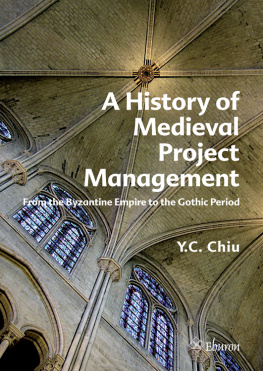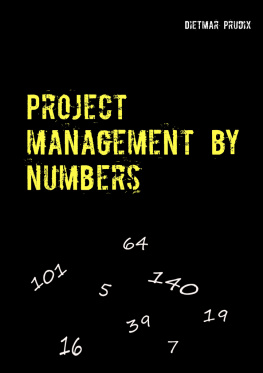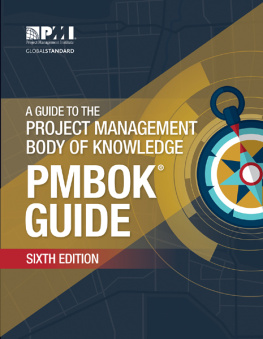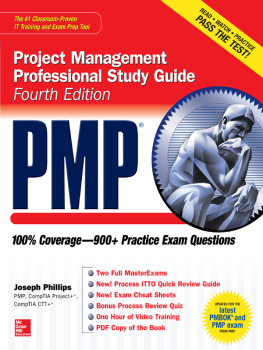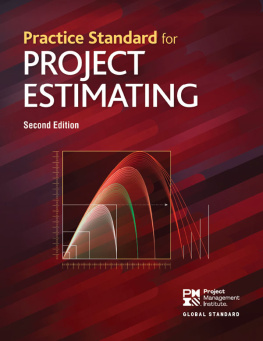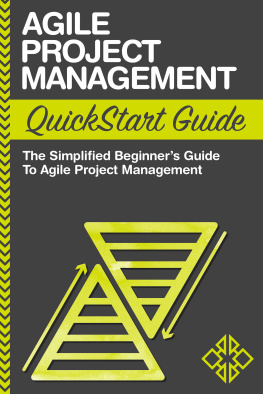A History of Medieval Project Management
From the Byzantine Empire to the Gothic Period
Y. C. Chiu

Eburon Delft / Zutphen
2012
ISBN 978-90-5972-611-6 (paperback)
ISBN 978-90-5972-612-3 (ebook)
Eburon Academic Publishers
P.O Box 2867
Nl-2601 CW Delft
The Netherlands
Cover design: Studio Hermkens, Amsterdam
Cover image: The clerestory windows and ribbed vaults of Notre Dame de Paris
Graphic design: Textcetera, The Hague
2012. Y.C. Chiu. All rights reserved. No part of this publication may be reproduced, stored in a retrieval system, or transmitted, in any form or by any means, electronic, mechanical, photocopying, recording, or otherwise, without the prior permission in writing from the proprietor.
To my brothers, L.C. and S.C., and their families
About the Author
Y.C. Chiu is an architect and project management consultant. He has over twenty-five years of architecture and project management experience gained internationally including England, Australia, Japan, and the Southeast Asian countries in all phases of architectural design projects. He is currently in his consulting career advising on the architectural feasibility of the historic preservation and the adaptive reuse of cultural heritage building projects in the Southeast Asian region.
Chiu is affiliated with a number of professional bodies including the Royal Institute of British Architects, the Royal Australian Institute of Architects, the Construction History Society, the Society of Architectural Historians, the Project Management Institute, the Chartered Management Institute and the Australian Institute of Project Management.
This is Chius third book on the history of project management. His academic knowledge and professional experience in both architecture and project management, together with his love of history, inspired him to pursue this meaningful subject of study. His books An Introduction to the History of Project Management: From the Earliest Times to AD 1900 and A History of Ancient Project Management: From Mesopotamia to the Roman Empire have also been published by Eburon Academic Publishers.
Preface
In his first book, An Introduction to the History of Project Management: From the Earliest Times to AD 1900, the author took an investigative journey through the history of project management in twelve periods of Western history that represented a timeline of over 5,000 years from the dawn of civilisation up to the turn of the twentieth century. The book ends just before the two forefathers of twentieth-century project management, Henry Gantt and Henri Fayol, codified their project management tools and elucidated the core elements of the project management body of knowledge.
The research identified six research topics, based on the areas of project management expertise described in A Guide to the Project Management Body of Knowledge (PMBOK Guide), to guide the data collection and research process. These topics were:
1.Cultural Environment
2.Scientific Environment
3.General Management
4.Construction Technology
5.Master Builder Tradition
6.Building Project Activities
As a result of the study, contemporary project management was placed into a historical perspective. Its significance could be more readily compared with that of earlier practices. The conclusions of the study might also contribute to the overall body of knowledge, unearthing lost or forgotten aspects of project management that are absent from todays science. It is hoped, in any case, that having shown the historical circumstances that have affected the development of project expertise and applications over time, further research can be done to increase the precision and value of both historical and contemporary scientific understandings of project management.
Based on the conclusions drawn in his first book, the author made a number of recommendations for the further study of the history of project management. He suggested that the areas of expertise should be further elaborated and categorised in more detail. In addition to the construction technology and master builder tradition sections of the previous research which represent the knowledge of application area the author suggested that the architectural principles of each historical period should be investigated. Furthermore, in addition to the cultural environment and scientific environment sections of the previous research which represent the Project Environments the author suggested investigation of the economic environment of each historical period. The author recommended four separate research studies of the history of project management in four broad eras of Western history:
1.Project Management in the Ancient Civilisations
2.Project Management in the Medieval Period
3.Project Management in the Modern Era
4.Project Management in the Contemporary Period
The history of project management in ancient civilisations has already been investigated in the authors second book, A History of Ancient Project Management: From Mesopotamia to the Roman Empire . The current book is the authors latest study into the historical development of project management. It is an attempt to investigate project management in the medieval period from the Byzantine Empire to the Gothic period in more detail. As with his previous books, this book is intended for project management professionals who would like to explore the significance of the history of project management.
Indeed, project management is the application of knowledge, skills, tools, and techniques to project activities in order to achieve defined requirements. It is the very deliberate orchestration of the areas of expertise to complete a specific project. Investigating the history of project management enables us to reach a comprehensive view of both the historical development of relevant areas of expertise and their application to project activities.
The author believes that the history of project management is more than just about the history of projects or the history of managing projects. It is about understanding the behaviour of project leaders in history and the choices they made when applying the areas of expertise to project activities. The goal of this research, together with the authors previous works, is to demonstrate that despite the relative newness of project management science as an academic subject, project management as a discipline has been around since ancient times. Through understanding the history of project management both in theory and practice one is able to approach and compare the complex and challenging problems of contemporary project management from a new yet historical perspective.
This research identified eight research topics, based on the areas of project management expertise in the PMBOK Guide , to guide the data collection and research processes. In its contribution to architecture, the research regards building construction and engineering structures as the application area of project management. It considers six periods of medieval Western history: the Byzantine Empire, the Islamic Golden Age, the Crusades, the Carolingian Renaissance, the Romanesque and the Gothic periods. This represents a timeline of over 1,000 years from the fifth to the fifteenth centuries. In addition, the research examines eighteen building projects to demonstrate the application of the areas of expertise to project activities.

